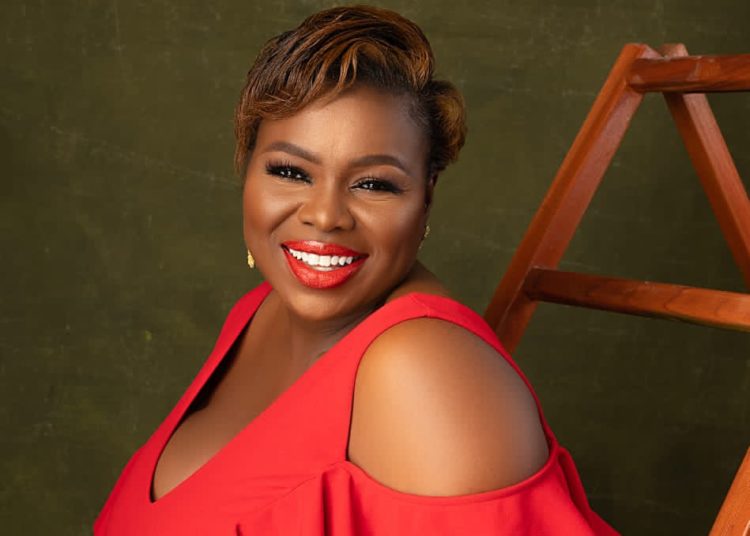Oforma Adaeze is the CEO of Lareigne Kreations. The energetic entrepreneur is actively participating in the ongoing 40 and Fabulous Reality Show. In this interview with Kakaaki Reporters, she speaks on her life, business and why she would win the show.
What informed your decisions to go into property or should I say the furniture business?
First of all, I’m from a family that you call an average Nigerian family. And being the first daughter you’re tasked with the responsibility of taking care of not just yourself but your siblings and including your parents. I’m 40-years-old. I have an MBA in marketing. I grew up in Port Harcourt, born in Enugu and served in Adamawa state. I’m a typical Nigerian. That helped me because living in different places were all products of nature and nurture, living with people interacting with them helps to form you and at least to free your mind and bias you might have about people. So I think growing up in Port Harcourt and knowing Igbo culture and living in the north has really helped in developing my IQ and EQ, especially being a woman in a furniture industry. Being raised in an average family where your parents want the best for you but can’t afford to give you all, and being fortunate to have a mother that’s creative and believes that you should never say no, like you should try and get it done. I started up early using my hands. So I walked to the tailor shop to get pieces of clothes and make something that I like that matches my dress. As a young you know teenager, people know your stuff is nice because it’s custom made, you don’t find it anyway. So growing up that way and—when I got into the university, I like to stay in a reserved space, I’m like an introvert. I need my own space even though I speak up when I need to. I stayed in this place that was really big but they didn’t have a toilet, and I loved the environment, they used to do short puts there. I looked at it and the room was big and I called the mason man and bought blocks and helped him when he asked me to provide labor will never forget I told him look I’ll get somebody the next day and when he came he saw me with short knicker I used head tie, I said I would do it. So I dug the suckaway mix sand and I will go from up into the suckaway, I was 18. I did what I wanted, lived in a space that I love because I never forget my mother had made me get used to using my hands to do things, so it was fun. I won’t lie, I was just waiting to leave school to start enjoying taking a piece and creating something out of it. When I finished youth service in 2004 in Yola, I knew I wasn’t going to serve and was going to work rather, but the thing is I had no capital, like no money and I had younger ones three now waiting for me to, you know, support back home. So I started-off frying chin chin. I will supply to supermarket at the same time using the money to do my masters for my MBA, and when I saved up some money, I was waiting to get a lot of money you know, but sometimes you get comfortable and then something happened one morning, on the 15th of February 2005 at about 3:00 AM I was frying… you know how Yola is very hot, so I have to fry early in the morning before the sun comes out and then the oil capsized, fell on the floor and the kitchen was on fire. I tried to run but some of the groundnut oil had already spilled on the floor and I was wearing bathroom slippers, so I slipped right into the fire and everybody was sleeping. Before I knew, my body was on fire, I called for help they came to help me but that accident redefined everything and changed the narrative for me , because I couldn’t fry chin chin, I couldn’t wear clothes for a couple of weeks and I got an order to make bedsheets for somebody and when I finished, I you know I ironed and packaged it. When I delivered it, they said it’s beautiful. Are you doing interior design? Now this is what I’ve always wanted to do. But no money, I say yes they say bring your company name, and I quickly ran to the business center printed a l letterhead made complimentary cards and that was how I got into furniture immediately, now not, waiting to have so much money. But before then when I finished the supply for bedding, I now wasn’t able to pay fees but they gave me some time to pay, but I started going to Abba vibrations come back go back selling overtime I raise capital the idea is to produce but I didn’t have money so I was just buying and selling then it got to a point that I just had to start. I didn’t still get the money so I called the carpenter behind my house and we’ll make one chair deliver it, make another, that was when I was living in a war room house, just one room and kitchen and toilet and I moved into a two-bedroom flat and then we started using my living room for the factory and my kitchen for the storage, the sewing and one other room for design, while I slept in one room. Then we continued with Lorraine creation until I got a factory space and went into full time furniture production. Now what happened is along the line, I had started taking courses to be an interior designer, two courses outside the country and all that, but I don’t know how to do carpentry work, I was serving the workers that were working for me, I was doing labour for them too. So over the years, I learnt from them ,the carpenters and others. I’m now learning to spray. The only thing is I don’t have much time to stay in the factory. That was how I started off in the furniture industry and I’m so lucky.
How do you feel working with men…have you ever been challenged before?
Okay…one thing has kept me going is passion. But I cried when your worker will look at you and say ” I get wife like you for house, I beg don’t talk to me like that, why you say customer no go take am? I bring the design, tell the customer to change am. If you get husband, you for nor talk to me anyhow. See Madam in short, I don tire, I nor work again. Na wetin make you never marry, yeah! If to say you get family. you for understand say dem nor they talk to man anyhow.” So you have the workers that you pay to contend with, then you have the clients that are not sure that a woman would deliver. Then you have the imported goods clients to contend with and you have the client who wants to say I imported it to try to convince them. It wasn’t easy , but right now, I don’t know if it’s wrong to say that I don’t see myself as a woman when I’m working because I do not whenever we women are working, oga you know I’m a woman . So I don’t see myself in that aspect. It wasn’t challenging but right now, I do not have such challenges. By September 26th I will be 18 years in this business. I have done the same thing, failed time and again with it, but most importantly I’ve been able to build a system that now works for me. So when someone now says madam, I say where is your contract paper, if you nor do am well, no money. Another thing is they know I know how to do the work. We are now colleagues. First I don’t even call them staff, I call them team members, I don’t boss it on them because our work is stressful. For me, our companies create a family centered environment where when you are coming to work you are excited. Though we have friction, from time to time, but really that male-woman thing was back in the days, right now, not the only thing as it were that were still having to battle with is being able to let the customer know that you will imported it does not make it any better, because truth be told Nigeria has the best wood we have iroko, mahogany and others have and as long as this would is well seasoned your furniture will come out top notch. We produce international standards and even the ones they bring to us for recovery, we video it and say see what you’re buying because for you to even import you will not use the wood that’s heavy, they are collapsible. That’s the thing where we time, we have been able to overcome that because one customer buys he’s satisfied. I have a customer that said to me last week my house keeps looking like it was made just yesterday and this is somebody that used the furniture, the dining, the cutting, everything for four years… so it keeps getting better.
Looking at the economic downturn in Nigeria today, would you say your products are affordable to low income Nigerians?
There’s always two sides to a coin: everything that has an advantage has a disadvantage and vice versa. Let me speak of the advantages first, because there’s some sort of cash crunch, it has reduced importation in the industry. The spending power slightly dropped hence, clients are now willing to give it a try. Before now you know it’s a lot of work to convince them but presently if you know you were going to buy a set of furniture for N5m, N7m and someone is willing to make it for you for less than N2m. And for very nice simple designs for N800k to 1.5m, especially if a colleague of yours or a friend of yours has actually used the same product from that company, I’m sure you want to give it a shot. That’s the advantage. Now the disadvantage it’s the prices of the raw material, even though wood that we get from our bush in Nigeria is affected because of cost of transportation and the clients are not trying to understand, that when you go to the market today you buy marine board for 12,000 tomorrow you go to the market they will tell you they are not selling that they want to watch the weekend and see what dollar is saying because they are not sure if they sell at 12,000. If the dollar increases within the week, if they will have enough money to go and buy, that’s the major challenge. What we’re doing at the center, I had to call my people and say… hey guys you know that before now where our margin was even very slim, (1) War against wastage. Most of us lose money in our production process waste either because we do not have a quantity control person that is properly trained to manage waste or the general culture in Nigeria to manage waste. I give an example: the particle boards we use, the NVF and the rest of their pieces are compressed and then they curl it nicely and we use it. But if we are able to manage waste then your profit margin would be sustained, so recycle. Recently, I got into a programme called 40 and Fabulous and we are trained on waste to wealth by art and culture. When I got back to the factory, I looked around and I said what can we begin to make from our waste? Presently we have a cake baker that we’re supplying cake stands and 50% to 60% of what we’re using is from our waste material, the only thing that would reduce the percentage to maybe 30-40 is the labour costs. But if you’re able to save 30 to 40% that’s a lot, so we’re looking at other lines of products. For instance, platters for your table pieces of wood ordinarily would throw pillows using firewood we give to them. We now have every Saturday 30 minutes of waste to wealth in the factory and you have to win a prize consistently for three weeks. We’re able to pick waste and get an idea of what to produce, everybody is gradually becoming conscious of not wasting things. That’s how we have been able to manage, but in order to keep up to make profit, if not, if you increase the prices of your items based on the current market rate you would not be able to sell because clients do not have that much spending power.
What’s your take on women going into male dominated trades or businesses like you are doing?
Why would you call it a male dominated industry? I’m a woman, I wear low cut, a man cuts my hair, a man makes my hair, a man is my nail technician so would I call that a female dominated industry? I think these are just perceptions because the truth is someone is enjoying what they are doing and they are guided on how to make it easier for them and they see that there is profit in it, then I think it would be good . Before now, if your child is playing football you don’t like it. But now, you have a child, you buy football for him, parents are encouraging their children to go be music artiste, play drums because you are seeing there is something, I mean they can make a good living out of it. For the industry, there are different aspects in it, it’s broad interior, you can just be a consultant telling people how to do their house, if you want to be a carpenter like myself, their are different segments even furniture, that is just so you know the right cutting list cardboard, screw machines and we have tools, power tools that make it easy for you to work. When I started to do a full upholstery, I was using a hand tacker, you will have to tack, but now we have a couple of compressors in the factory which makes it easy. So we are not exacting how much energy as a woman. OK because they say women are the weaker vessels, but when it comes to taking up less possibility multitasking in their home we do it so really we have a lot you had the soft furnishing you have throw pillows you have mats you have painting you have a lot so it’s it’s an industry that, if a woman is well mentored and you see that you can be you know contribute to your path to your family and to the nation at large, then we have to give it a shot, because I personally at the moment I’m training young boys, but I want to be able to increase my capacity in a factory to take up fast start with three women, three ladies, and over time have a lot of them have them in sections. If you go to India, Bangladesh, Morocco, you see women making these things with their hands and yeah, they are adding value to the economy. So women are coming on board eh… don’t worry, let’s share the industry together.
You talked about a reality show 40 and Fabulous, can you tell us more about it and why you decided to be part of it?
40 and Fabulous Reality show is a TV programme that is highly educational and entertaining. When I heard of the synopsis of the show, one is for women that are 40 years and above, knowing that in this part of the world once you’re 35-40years, you have children, you are born. These organisers say look those women can dream, if you don’t make it at 20, you don’t make it at 30- 40 is not a barrier, and for me, I would say if you have done something, failed and gotten up, by 40 years the experience you have is enough resource for you to succeed at everything you’re doing. So for the show, we were put in a house and were trained by SMEDEN, Women and Access Bank, Arts and Culture , very fantastic. Like I told you, my waste to wealth in the factory is already the knowledge I got from them, converting waste to wealth and we’re already cashing out in the factory with that. After the training we were told that hopefully we’ll get some grants from the facilitators like the women initiative of Access Bank and SMEDEN and to be able to empower our businesses. Again, the emotional intelligence training was hard because the truth is now a body knows about mental health. I say woman, you’re juggling family, business and opportunity to experience and yet other people told me it is quite encouraging to know that they are not the only one going through this thing. We are at the peak of determining who the winner would be. Though the course is a good experience, the best experience is to be the winner.
Where do you see your business in the nearest future and how can the government come in to support small SMEs like yours with capital?
When I set up Lareigne Kreations in 2005, the idea was to be able to enhance lifestyle for people without breaking a bank. Again, you remember where I’m coming from, I desire these things, I don’t have them, I try to create them. Growing into this level, I’ve never really seen impossibilities, but right now I’ve seen more possibilities and Nigeria has a lot. In five years Lareigne Kreations would take Nigeria to the world. We have beautiful designs, we have creative minds, make pieces and by next year by God grace, I’m hoping we’ll have the funds, I would like to attend a show in Paris with one of my team members, maybe carpentry or upholstery and make simple nice things we can take over there. Let people see that’s the story they hear in the news and all that is not all that there is to our wonderful nation Nigeria. Again one of the major reasons I got into this, is to be able to express myself, to have fun. There are a lot of people that are looking for ways to express themselves. If you are engaged doing something you absolutely love you’ll have little chances to get distracted into being violent or doing, you know ,the banditry and whatever or even complaining. So being able to grow our factory capacity to keep people and train them ,because of the people that we are training presently live with me in my house because some of them don’t even have a place to stay. So it’s not just about training them in furniture making, but in the character that personality and that human relationship you need to be able to develop, that’s what we’re looking at. Maybe along the line, we have an Academy to be able to get people to go through the process, doing architecture where you practice things like technical drawings ,students in school you know you’re doing the aspect of home economics get them to come in and then, that’s another way to give . And for what the government can do, I’m sure you know that the light issue is already a national anthem, is your chorus everybody is singing. But for SMEs like us, right now I don’t have a good drying machine because we can’t afford one. If we get some of these machines at single digits interest rate, to get funds then your production capacity will increase, then women you mention coming into the industry can also increase because we’re using machines, we’re not exerting energy and when you use machines you have finer finishing. Right now we’re spending money, we buy wood just because we’re all for the quality, we keep them for eight months to one year to dry before use. Now that money is starched out, but if we had the machine we’ll be able to be turning over our money. If we can get it, I’m in a facility where I’m paying rents for a factory space, so you can imagine how much that will be in Abuja, but to be able to buy land in Abuja, I’m not deterred, I will keep going. But yeah…the government can really help us with making available funds without much hassle.





